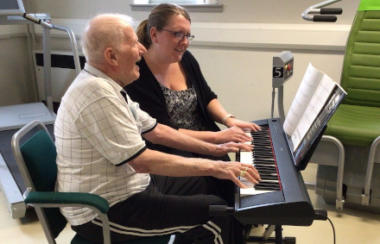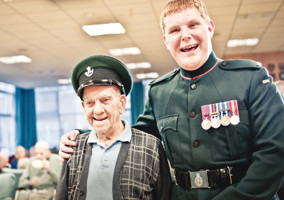What makes a good collaboration? Most charity sector workers will have an opinion on what excellent partnership working looks like. We certainly do. But, for us, the key question was actually how can collaborative working create impact and stimulate innovation?
We started the Paul and Nick Harvey Fund with a great partnership – Sir Tom and Lady Marion Hunter generously donated £500,000 live on BBC Breakfast to support the vital work of musical practitioners across the UK, who were working with people living with dementia.
They were a perfect partner, allowing us to guide the fund in the way we knew would deliver impact for grassroots musical organisations and, most importantly, people living with dementia. We worked quickly, with only a small team of four running the fund and distributing the entire funding pot within five months. In part, The Hunter Foundation’s willingness to trust our instincts and let us work rapidly delivered our promise of high quality and agile funding.
An agile and strategic team
The other part of this pairing to deliver accessible and immediate support was an agile and strategic team.
We worked in collaboration with partners on the ground, speaking first with, and more importantly actively listening to organisations delivering music to people living with dementia to establish the critical needs in the sector. Our role as a funder meant we could quickly build an infrastructure for grant funding reflective of these critical needs.
Again, working closely and collaboratively with trusted partners at every turn, we drew upon their expertise to sense check our ability to deliver this funding. Working in partnership at every level was critical to the success of this work.
Attracting more support for the work
Delivering this funding so rapidly allowed us to capitalise on the media interest around the work and draw the attention of the National Academy for Social Prescribing (NASP).
Music for Dementia and NASP already have a shared vision around a non-medicalised approach to health and wellbeing; we both aim to put people and what they want at the heart of their care. This shared vision has always enabled us to work from a point of shared understanding with the Academy and its team.
Recognising the value of the musical activities the fund was supporting, and their future role in the development and expansion of social prescribing, NASP offered a partnership by supporting the fund with an additional £100,000.
This has brought benefits to all parties – it has helped to position music as a key medium through which to deliver social prescribing, further raised the profile of our Music for Dementia campaign and the role of music in dementia care, and provided much needed support to organisations and charities as they recover and rehabilitate from the pandemic.
Crucially and core to this, it has meant that for people with dementia, access to musical services has been increased.
Honesty, agility, listening and open conversations
In creating a second round of funding through the partnership with NASP, we looked again at the pool of original applications received to the fund and began to identify exceptional innovation at a community level, which could be supported by this additional funding.
Working within the framework of our already active fund and responding rapidly allowed us to balance the needs on the ground, and those of our partners. We were honest with our collaborators about the reality of grant funding in this way.
We had open and transparent conversations with the grantees of this new round, talking with them about their critical needs and the ways in which these needs may have changed since their initial application.
Honesty, agility, listening and open conversations were vital to moving this collaborative fund forward. Importantly, these principles underpinned every level of our work – from working with organisations and individuals on the ground, to brokering support and strategic partnerships to further the impact of this fund. We recognised, at each turn, what we could offer the partnership and what we needed to look to others to examine or establish.
Ripple effect
To date, £612,000 has been distributed by the fund, all of which has reached organisations within eight months, and has supported 31 organisations to deliver music to people living with dementia.
We hope the funding will ripple out across communities in the UK, supporting more people living with dementia to access musical activities throughout their lives.
Good collaborations spark further collaborations
Having gone through this collaborative process, what are our reflections?
We hope that this collaborative partnership, and the active ingredients involved in making it successful, models ways of working others can adopt and adapt when they are thinking about collaborative funding.
We would also say that good collaborations spark further collaborations and strengthen existing partnerships. When the fit is right, collaborative working benefits all.
To do that effectively, clarity of purpose and communication are central so that a shared point of understanding can be established and worked from. This enabled us to work strategically with a local focus.
We also remained focused on our vision and what we were trying to achieve – keeping people and their needs at the heart of this collaboration - and returned to this again and again.
And lastly, we enjoyed it! We enjoyed working with another team, and developing greater joint commitment to our shared vision of helping to enhance and enrich the quality of life for those living with dementia.
Grace Meadows is campaign director at Music for Dementia and Lizzie Cody is foundation manager at The Utley Foundation
Related articles











